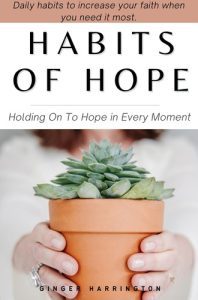Discover how gratitude can anchor your heart through grief and trauma. Learn practical, biblical steps to find hope—even when gratitude feels impossible.
Have you ever walked through a season so heavy that gratitude felt impossible? It’s one thing to jot down a gratitude list on an ordinary Tuesday—but when life gut-punches you with loss, trauma, or overwhelming stress, even simple practices can feel out of reach. In those moments, gratitude can feel like one more thing you “should” do, but simply cannot.
So what does practicing gratitude in grief and trauma actually look like?
Gratitude in hard seasons isn’t about feeling thankful for the pain—it’s about noticing God’s presence in the midst of it. It’s learning to anchor your heart to truth when your emotions tell a different story.
In this week’s Habits of Hope episode, we approached this tender topic in two parts:
- First, Larissa shared candidly from her experience as a widow—how grief reshaped her life and how long-rooted gratitude practices carried her when nothing felt steady.
- Then, we took the conversation deeper by inviting licensed professional counselor Heather Shealy-Mawhirter to help us explore the intersection of trauma, grief, and gratitude with biblical wisdom and clinical insight.
This two-part conversation created a beautiful blend of lived experience, practical tools, and compassionate guidance—offering hope for anyone walking through loss, trauma, or the slow work of healing.
What We’ll Explore in This Post
In this two-part conversation, we walk through:
- Why gratitude feels especially difficult in seasons of grief and trauma
- How long-term spiritual habits can steady you when life falls apart
- Practical ways to interrupt negative thought spirals
- The difference between grief and trauma—and why both affect gratitude
- Gentle, realistic steps toward gratitude when your heart feels fragile
- How gratitude becomes an anchor of hope in painful seasons
- Biblical truth that reminds you God is near to the brokenhearted
These insights come from Larissa’s story as a widow and our deeper conversation with licensed professional counselor Heather Shealy-Mawhirter.
A Scripture to Ground Us in Seasons of Grief and Trauma
Before we go further, we need a steady place to rest our hearts. Paul’s instruction in 1 Thessalonians 5:18 reminds us that gratitude isn’t about denying pain but recognizing God’s presence in it.
“Give thanks in all circumstances; for this is God’s will for you in Christ Jesus.” —1 Thessalonians 5:18
Not for all circumstances…
In all circumstances.
That distinction matters deeply when your heart is aching.

Why Is Gratitude So Hard in Seasons of Grief or Trauma?
When life is heavy, gratitude feels hard because you’re already at capacity.
Stress, transition, loss, or trauma narrows your world to survival. As Heather put it in our conversation, grief and trauma can create a microscopic view—a tunnel vision where all you see is the pain in front of you. In that place, even good things feel distant or invisible.
And this is important:
Your struggle with gratitude does not mean you lack faith. It means you are human.
When nothing feels like a blessing…
- Pain seems louder than God’s goodness
- Discouragement blinds you to what’s true
- Feelings insist “God is absent,” even when He isn’t
- Your body and mind are exhausted from holding so much
But as Larissa reminded us:
“Two things can be true at once: pain is real, and God’s goodness is still present.”
How Do Long-Term Habits Help Us in Hard Seasons?
One of the most meaningful insights Larissa shared came from her journey through her husband Bill’s cancer and eventual loss. When grief was at its heaviest, one rhythm stayed steady:
Her gratitude practice.
Because she had cultivated it for years, it became a familiar place to return when everything else felt upended. Newer habits slipped away—but gratitude had become a deep-rooted rhythm with God. I’ve seen this in my own hard seasons as well: consistent gratitude quietly strengthens us long before we know we’ll need it.
Over time, gratitude becomes:
- A natural response
- A source of resilience
- A way to return to truth when emotions flood
- A habit that carries you when you don’t have strength to build one
Habits built in calmer seasons become anchors in painful ones.
This isn’t self-effort. It’s spiritual formation—God’s steady work in us over time.
How Can We Avoid Comparison When We’re Grieving?
Grief is a tender place, and comparison makes it heavier.
Larissa shared honestly about seeing widows who could run marathons or maintain routines she simply couldn’t. And she had to remind herself—that’s not my story right now.
Your capacity in a season of grief will look different from others’.
- Your “best” today may not match your “best” yesterday
- Healing isn’t linear
- God is patient with you—and you can be patient with yourself
- Your story unfolds at the pace your heart can bear
Comparison steals compassion from yourself.
What About Spiritual Dryness When Nothing Feels Like a Blessing?
Sometimes grief or trauma brings seasons where you know God is faithful, but you don’t feel His goodness. Spiritual dryness whispers:
- “I’m not blessed.”
- “God has forgotten me.”
- “There’s nothing good here.”
But as Larissa said, feelings aren’t facts.
Psalm 23:6 reminds us:
“Surely goodness and mercy will pursue you all the days of your life.”
Even on days when it’s hard to see.
When your perspective blurs, I often think of it like wearing glasses. Without truth—God’s Word, God’s promises, God’s character—everything becomes fuzzy. But truth helps you “put your glasses back on,” allowing you to see God in the details again.
When feelings blur your view, truth restores your perspective.
Practical Ways to Interrupt the Negative Thought Spiral
Negative thoughts can feel like a runaway train—but they don’t have to park permanently in your mind.
Here are some practices we discussed that help interrupt discouragement before it takes root:
1. Stop the Negativity Train Early
Notice when your thoughts start spiraling and gently interrupt the narrative.
Application: Ask, “Is this thought true? Is it helping me trust God?”
2. Take the Next Right Step
When emotions overwhelm, choose one grounding action—one prayer, one verse, one gratitude sentence.
Application: Write a single line: “Today I’m thankful for…”
3. Reset the Atmosphere with Truth or Music
Worship, movement, or even a 30-second “reset” can shift your perspective.
Application: Play one worship song and let it redirect your focus.
4. Give Yourself Compassionate Self-Talk
Speak to yourself the way you’d speak to a grieving friend.
Application: Try: “It’s okay to struggle. God is with me in this.”
What Is Trauma—and How Does It Affect Gratitude?
Before we closed the episode, we knew we needed to go deeper. Gratitude in everyday stress is one thing—but gratitude in trauma is another experience entirely.
Because this tender space deserves wise and compassionate guidance, we invited licensed professional counselor Heather Shealy-Mawhirter to help us understand how trauma affects the heart and what gratitude can look like when life has been torn in two.
Understanding Trauma: Big-T, Little-t, and Hidden Grief
Heather offered a powerful clarification: trauma exists on a spectrum.
- Big-T trauma: threats to life or safety
- Little-t trauma: losses that reshape your world—security, identity, relationships, stability
These less visible experiences often create what Heather called disenfranchised grief—grief that’s real and heavy, but not publicly recognized or supported. The world may not see it or validate it, but your heart feels it all the same.
Why Gratitude Feels Inaccessible After Trauma
In these places, gratitude doesn’t always feel available. In fact, it can feel inappropriate or even impossible—and Heather affirmed that this is completely normal.
Trauma can shrink your world until all you can see is the pain right in front of you. In that place, gratitude isn’t meant to erase the hurt or minimize your grief.
Instead, Heather offered a beautiful reframe:
Gratitude is like a patient friend waiting quietly in the corner until you’re ready to approach it.
You don’t have to force it.
You don’t have to fake it.
You don’t have to be ready before you’re ready.
Heather also reminded us that your emotions don’t obey commands. You can know the truth, believe the truth, and still not feel the truth right now. That isn’t a failure—it’s part of the normal neurological impact of grief and trauma.
In these seasons, your heart often needs time to catch up to what your mind knows. Gratitude becomes a gentle reminder rather than an emotional requirement.
How Gratitude Gives You Something to Hold Onto
When your heart does have space—sometimes just for a moment—gratitude can become something steady to hold.
Heather shared a story about a steep climb in Utah, where hikers reach a point where the trail narrows along a cliff. At critical points, steel chains are bolted into the rock for you to grab so you don’t slip over the edge.
Gratitude, she said, is like those chains.
It doesn’t make the path less dangerous or the climb less steep, but it gives you something solid to grip while you navigate the most perilous stretches of grief and trauma.
Gratitude anchors what was meaningful and good.
It reminds you that your story holds more than the pain.
It helps you carry forward the gifts that shaped you, even as you acknowledge the ache of what was lost.
Some days grief will lead, and some days gratitude will lead—and both are allowed in the healing process.
Gratitude doesn’t deny trauma. Gratitude gives you something steady to hold while you walk through it.
How Gratitude Helps You Tell the Whole Story
Heather also shared that trauma tries to convince you your entire identity is wrapped up in the painful moment.
Gratitude gently helps you tell the whole story—not by erasing trauma, but by reminding you of the goodness, love, and meaning that still exist alongside the pain.
Gratitude expands your perspective so you’re not defined by the wound, even as you honor its impact.
How Does Gratitude Help Us Hold on to Hope When Life Feels Broken?
Grief and trauma often make hope feel far away. Your world narrows to the pain right in front of you. But gratitude gently widens your view:
- It reminds you this moment isn’t your whole story
- It reconnects you with the gifts and love that shaped your past
- It helps you sense God’s presence in your present
- It opens the door to believing that healing is possible
Heather shared beautifully:
“Your pain is real and meaningful, but it is not who you are.”
Gratitude becomes a bridge to hope—not by erasing the ache, but by reminding you that God is still writing your story.
One scripture offers deep comfort here:
“The Lord is close to the brokenhearted and saves those who are crushed in spirit.” —Psalm 34:18
Sometimes the only gratitude you have is this:
“God, I trust that You are near.”
That is enough.
Gentle Next Steps: Small Ways to Move Toward Gratitude in Grief and Trauma
Now that we’ve explored what trauma and gratitude look like together, Heather helped us identify some gentle ways you can move toward gratitude—only as your heart is ready.
1. Stop Fighting to Feel a Certain Way
When trauma or grief hits, we often feel pressure to “get back” to who we were before. But as Heather explained, trying to fight your way into gratitude only exhausts your heart.
Try this: Give yourself permission not to feel grateful today. Simply let your heart be where it is.
Why it matters: This removes shame and frees you to heal with God’s pace rather than your own.
2. Allow Any Good Thing to Simply Be Good
Instead of forcing gratitude, Heather encourages acknowledging even the smallest good around you—a warm blanket, a gentle word, a moment of quiet.
Try this: Name one small thing that is good today, without minimizing it.
Why it matters: This shifts your body out of resistance and into receptivity.
3. Think of Gratitude as the Patient Friend in the Corner
You’re not running away from gratitude; you’re simply not ready yet. According to Heather, gratitude waits until your heart has space.
Try this: Instead of “listing gratitude,” whisper: “Lord, help me notice one small grace when I’m ready.”
Why it matters: This keeps gratitude accessible without pressure or performance.
4. Grab the Next Chain on the Cliff
Heather’s Utah hiking story paints a vivid picture: when the trail narrows and the cliff steepens, you grab the chain that’s bolted into the rock.
Try this: When emotions overwhelm, reach for a single grounding truth—one verse, one prayer, one memory of God’s faithfulness.
Why it matters: Gratitude becomes the anchor that steadies you when the path feels perilous.
5. Practice Looking Beyond the Microscopic View
Trauma narrows your vision until all you see is the pain in front of you. Gratitude helps widen that view, reminding you that this moment isn’t your entire story.
Try this: Ask: “What part of God’s goodness have I seen in the past that I can carry forward today?”
Why it matters: This helps you “tell the whole story,” not just the painful parts.
6. Let Grief Lead Sometimes—and Let Gratitude Lead at Other Times
Heather reminded us that grief and gratitude aren’t enemies. Some days, grief will lead. Other days, gratitude will.
Try this: Give yourself permission to let today be whatever it is.
Why it matters: This releases the “all or nothing” mindset and honors the real healing process.
7. Start Small, Stay Gentle, and Trust What You Know
When your emotions don’t line up with truth, Heather encourages taking a small step toward what you know rather than what you feel.
Try this: Pray, “God, help me trust what is true even when I can’t feel it.”
Why it matters: Emotions catch up slowly—and God is patient with that process.
FAQ: Gratitude in Grief and Trauma
1. Is it wrong if I don’t feel grateful during grief?
No. Grief narrows your world, and emotions can overpower truth. Gratitude is not a requirement—it’s an invitation you can accept when your heart is ready.
2. How do I practice gratitude when everything feels shattered?
Begin with one thing. One moment. One breath. Look in gratitude’s direction before you try to feel it.
3. Does gratitude minimize my suffering?
Never. Gratitude and grief are not opposites. Both can be true—and both can shape your story with honesty and hope.
A Gentle Conclusion for Your Heart
Friend, gratitude in grief and trauma isn’t about pretending everything is okay.
It isn’t about suppressing your pain or forcing your emotions to behave.
It’s about anchoring yourself to God’s presence—the One who carries you through the valley, sits with you in the questions, and stays close when the world feels unsteady.
Gratitude doesn’t deny the hard—gratitude declares that God is still faithful in the hard.
About Heather Shealy-Mawhirter, LPC
Heather Shealy-Mawhirter is a Licensed Professional Counselor in Texas with over ten years of experience helping clients navigate grief, trauma, and the deep work of emotional healing. She specializes in Narrative and Solution-Focused Therapy and has worked extensively with survivors of sexual trauma, individuals facing anticipatory grief, and those walking through significant loss.
Her background includes service with organizations such as The Rape Crisis Center, The Children’s Bereavement Center of San Antonio, Any Woman Can, and 1HOPE for Kids. Her years alongside Adventure Therapists also shape her unique, experiential approach to healing.
Heather is passionate about supporting people in seasons of transition, questions of identity, and struggles with self-worth. With a compassionate presence and grounded faith, she offers both practical insight and gentle encouragement to help others move toward hope and wholeness.
About the Author
Ginger Harrington is a writer, speaker, and author of Holy in the Moment. She encourages women to deepen their walk with Christ and live with everyday hope. As the host of the Habits of Hope Podcast, Ginger loves creating conversations that offer practical encouragement for real life.
This article was written by Ginger and shaped by the lived experience Larissa Traquair shared from her grief journey, along with the compassionate insight offered by licensed professional counselor Heather Shealy-Mawhirter.

 So glad you're here. I help busy women—gals like you— build healthy habits for living well with biblical wisdom and practical steps to deepen your faith, increase your hope, and thrive in your purpose.
So glad you're here. I help busy women—gals like you— build healthy habits for living well with biblical wisdom and practical steps to deepen your faith, increase your hope, and thrive in your purpose.



